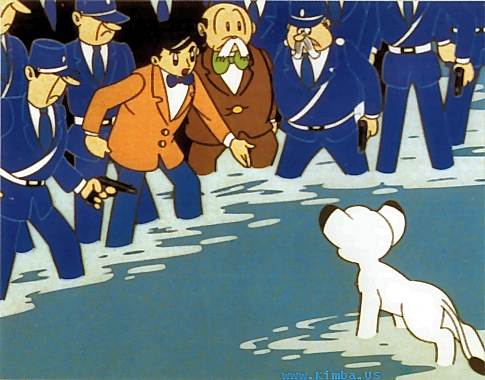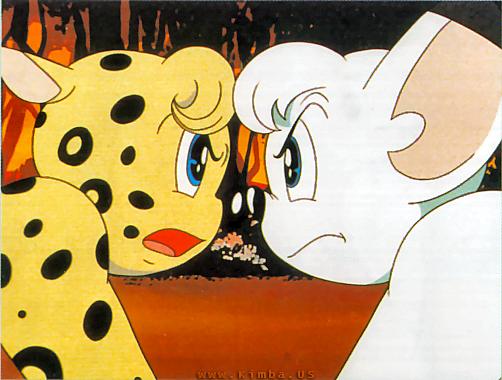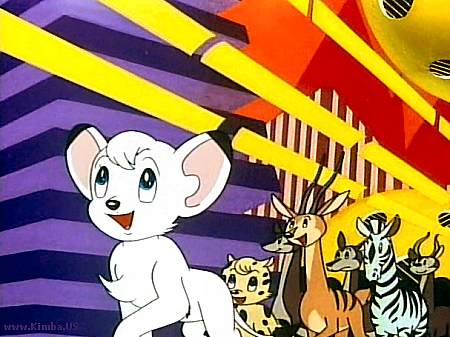


This episode is amazing, both for its original content and for the contrasts between the two English-language versions.
The original Japanese episode embodies the best of Tezuka's work. Kimba/Jungle Emperor always is at its best for me when it shows interaction between people and animals, because that goes to the heart of its message. The story shows Kimba during the time period between his escape from the ship where he was born and his return to Africa. It opens with Kimba on an excursion to a Paris exposition, with Roger Ranger/Kenichii, Mary, and Mr. Pompus/Higeoyagi. These three humans treat Kimba as part of the family (although Mary is somewhat abusive, foreshadowing her amnesiac life as Tonga). When Kimba leaves them, seemingly just for a moment, he is plunged, literally, into darkness, where he meets an old leopard who has the reputation of being a monster that inhabits the sewers under Paris. We learn that this leopard was wounded in a fight with Panja and while incapacitated he was scooped up by a hunter and sold to a circus. As he grew older and started going blind, he figured he would be destroyed --since humans have little, if any, respect for the lives of animals-- so he escaped and hid in the sewers. He had a dream of one day returning to his homeland, and Kimba immediately offers to help him do so, since Kimba always remained firm to his mother's admonition to return to Africa and maintain the peaceful kingdom his father had established. No sooner does Kimba make this promise, however, than the old leopard is killed by officers sent to seek out the "monster".
(As an aside, it occurs to me that this story was reworked into the second episode of the 1989 re-make of the Jungle Emperor series. Despite the many differences of that series, this story made one of the strongest episodes of that version as well.)
| Kimba is rescued from the sewers, naturally... |  |
| ...and we have been told the story of the old leopard in flashback, as a result of Kimba meeting the old leopard's grandson, Bongo (Speedy in the American version). |  |
| The episode ends with a fantastic, yet poignant, sequence showing Kimba's dream of a futuristic paradise for all the animals, full of 1960s-vintage World's Fair imagery. |  |
Tezuka's original is a wild mix of the drama I have described above, a deep feeling for the effects on animals of the way they are treated by humanity in general, important character development, and silly jokes and slapstick. It is also one of the longer episodes, running 23 minutes and 30 seconds (not counting theme songs), and this is the reason the English-translated versions are so different--it simply is too long to run in its entirety on commercial TV here.
The 1966 American version contains many flaws that end up transforming what I feel is one of the most important stories of the series into a silly fantasy. Don't get me wrong; I have the deepest love for the original American version of Kimba. Billie Lou Watt was the perfect voice for the character, and all the actors were wonderfully talented. But they were constrained by requirements to soften the stories, and made a few mistakes as well. So, both leopards are described as cheetahs; not a fatal error, but confusing given the way they are drawn. More damaging is the way the story is altered: the old leopard supposedly feigns his death and so is still living in hiding in the sewers of Paris! Kimba then supposedly appeases the distraught Speedy by offering to take him to the Paris sewers to see his grandfather, and we are asked to believe that what was meant to be Kimba's dream of the future is a collection of scenes of a large number of jungle animals wandering unmolested through the Paris exposition. Changes like this are what saddled the show with a reputation as being designed strictly for little children.
The Canadian version of this episode, released in 1993 and shown around the world over the past several years, gives us the undiluted version of the old leopard's fate, but, due to editing for time, totally omits Kimba's dream of the future, robbing the story of a large part of its power and hiding an important aspect of Kimba's character. They cut out the heart of his story, that which makes this series so loved by its fans.
Because this episode has never been truly, completely available outside of Japan, and recognizing how Tezuka could tell a story with an important message in the guise of a cartoon about funny animals, I say there is a need for a full and proper SUBTITLED and unedited release of this entire series for the American market. English-speaking people have been given only a taste of the full richness of Tezuka's Jungle Emperor, and still they love it dearly. It is time to allow them to see and feel the real thing.